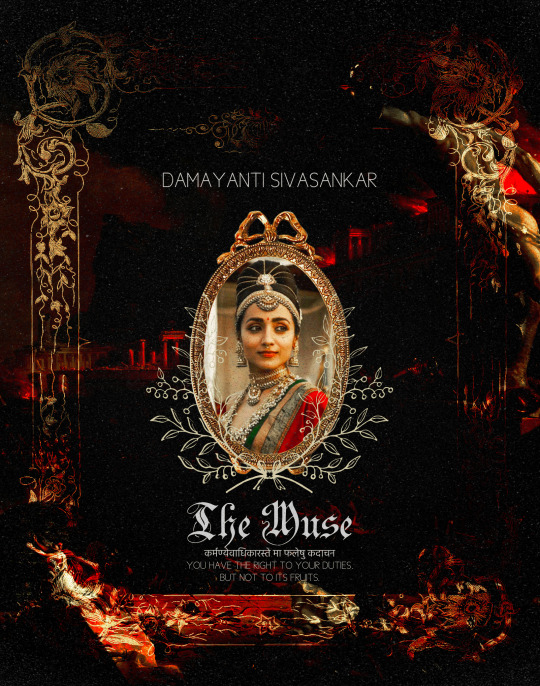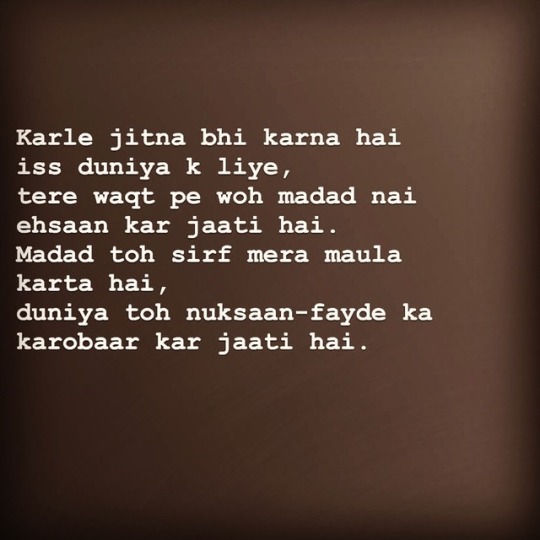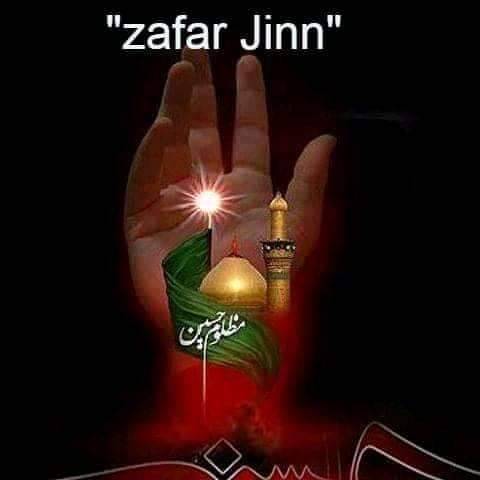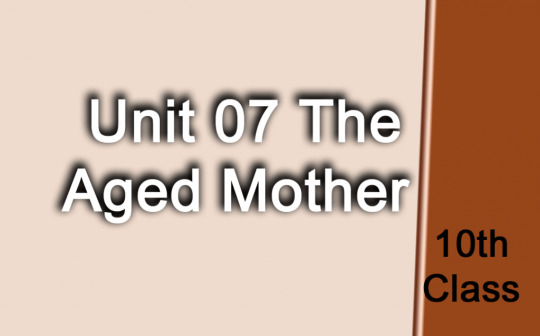#Urdu writ
Text
kya khabar kon tha or wo mera kya lagta tha jis se milkar mujhe harr sakhs bura lagta tha
#kanya-ke-dairy-se#desiblr#desi tumblr#desi tag#desi stuff#desi teen#desi things#writting#writings#writers on tumblr#writing#writeblr#urdu shayari#urdu literature#urdu lines#urdu stuff#urdu poetry
36 notes
·
View notes
Text
Zeb-un-Nisa, Aurangzeb’s eldest daughter, is born in Daulatabad in 1638 when Aurangzeb is governor of the Deccan. While Daulatabad fort dominates the horizon from a hilltop, Aurangzeb is building a new capital at Khadki town, stronghold of Jahangir’s old nemesis, Malik Ambar the ‘rebel of black fortune’. Malik Ambar is now long dead, having never allowed the Mughals to claim the Deccan while he lived. Zeb-un-Nisa, daughter of the Persian noblewoman Dilras Banu Begum, grows up in this provincial capital, far from the intrigues of the Mughal court. In the Deccan, the supremacy of her father is unchallenged and Zeb-un-Nisa is given a rigorous education under the supervision of Hafiza Mariam, a scholar from a Khurasani family. Zeb-un-Nisa is an excellent student and excels in the Arabic and Persian languages. Her father is so delighted when she recites the entire Quran from memory as a child that he gifts her 30,000 gold mohurs. In her erudition and her quick wit she is very like her aunt, Shahzaadi Jahanara, whom her father respects above all the other women of the court. When she is fifteen years old, she visits Shahjahanabad with Aurangzeb’s zenana as they return from the doomed Kandahar campaign. She is enchanted with the sparkling new city, the elegant women with their refined tehzeeb, their every gesture studied and full of grace. In the travelling court of her father, in these wildering years, it is a more pragmatic and pared down zenana but in 1658, when Zeb-un-Nisa is twenty years old, Aurangzeb deposes Shah Jahan and his household moves to Shahjahanabad.
Dilras Banu Begum, the somewhat haughty senior wife of Aurangzeb, is now dead. Even Aurangzeb, when giving marital advice to a grandson, will later admit that ‘in the season of youth’, he ‘too had this relation with a wife who had extreme imperiousness’. Since the other wives of Aurangzeb have less illustrious backgrounds, the senior women of the royal zenana are Roshanara and her eldest niece, Zeb-un-Nisa.
For twenty years Zeb-un-Nisa will be one of the most influential women of the zenana at Shahjahanabad. Her particular area of interest is poetry and literature. She collects valuable manuscripts and books and her library is one of the most extensive in the country. When Aurangzeb begins to retrench imperial patronage towards music and poetry, it is the royal women, the shahzaadas, the noblemen and then, later still, the wealthy middle class of Shahjahanabad who will continue the patronage of the arts. The governor of Shahjahanabad, Aqil Khan, is himself a poet and writes under the pen name Razi. Indeed, despite Aurangzeb’s later disfavour, Shahjahanabad fairly pulses with music. It tumbles from the kothis of the courtesans, the women thoroughly trained singers themselves, who bring Delhi Qawwali singing to mainstream attention. It vaults out of the large mansions of the newly wealthy, who prefer the lighter Khayaal and Thumri styles. In the gloaming of a tropical evening, it throbs out of the immense havelis of the princes and the noblemen, in the tenuous hold that Dhrupad still has amongst the elite of the Mughal court. And the poets keep gathering at Shahjahanabad, despite Aurangzeb’s dismissal of them as ‘idle flatterers’. They come from very far, like Abd-al-Qader Bidel, whose family is Chagatai Turkic but whose poetry so defines a phase of Shahjahanabadi poetry that he becomes Abd-al-Qader Dehlvi. Some will come from the Deccan, like Wali Dakhni, and some are born in the narrow, winding galis (lanes) of Shahjahanabad itself. They will write in Persian, in Urdu, in Braj and later in Rekhti. They will write in obscure philosophical quatrains, in flamboyant ghazals or in erotic riti styles but many will glow with the high-voltage mysticism of Sufi thought, for the ghosts of Shahjahanabad’s Sufi saints will enchant all the poets of the city.
Zeb-un-Nisa, like Jahanara who returns to court as padshah begum in 1666, is instrumental in supporting the work of writers and poets through her patronage. She supports the scholar Mulla Safiuddin Adbeli when he translates the Arabic Tafsir-i-Kabir (Great Commentary) into Persian and he dedicates the book to the shahzaadi—Zeb-ut-Tafasir. She also sponsors the Hajj pilgrimage of Muhammad Safi Qazwini. Qazwini will write an extraordinary account of his voyage, the Pilgrims’ Confidant, unique in its genre and magnificently illustrated and will dedicate it to Zeb-un-Nisa. For a few years, the courts of Jahanara and Zeb-un-Nisa will nurture this eclectic maelstrom of a culture, which has much more in common with Babur and Humayun’s camaraderie of artists than it has with Aurangzeb’s increasingly austere one. When Aurangzeb bans opium and alcohol, the easy complicity that the noblemen and padshahs shared in the ghusal khaana or the Deewan-e-khaas while drinking wine, is now forbidden. The imperial women, however, continue to drink wine, often made from grapes in their own gardens, flavoured with spices.
In 1669, Zeb-un-Nisa attends the lavish marriage ceremony of her cousin, Jaani Begum, to her brother, Muhammad Azam, at the haveli of Jahanara. There will be other weddings too: her sister Zubdat-un-Nisa will marry Dara Shikoh’s youngest son Siphir Shikoh and Mehr-un-Nisa will marry Murad Baksh’s son Izad Baksh. But for Aurangzeb’s oldest daughters, there are no more cousins to marry. There is an understanding, also, that these oldest daughters, like their aunts, possess a powerful charisma as Timurid shahzaadis and must be kept within the controlling orbit of the imperial zenana. The decades pass and still Aurangzeb rules, as resolute and restless as a young man. His sons, meanwhile, are growing old and impatient. Muhammad Akbar is Zeb-un-Nisa’s youngest brother and she is particularly close to him, as their mother Dilras Banu died soon after giving birth to him, when Zeb-un-Nisa was nineteen. The other sons are middle-aged men, and there have been skirmishes, the shahzaadas jostling for power, always subdued immediately by their unforgiving father. In 1681, when Muhammad Akbar decides to challenge his father, with the support of a Rajput alliance including the Rathors of Jodhpur, Zeb-un-Nisa is in a particularly vulnerable position.
In 1681, Jahanara dies. The imperial zenana has glowed with her ambition and talent for more than half a century. If the shahzaadas are uncertain about the future leadership of the Mughal empire, then the stakes are almost as high in the imperial zenana. Zeb-un-Nisa believes she may become the next padshah begum. She is a woman of letters, like Jahanara, with the same Sufi inclinations too. She is the eldest of the Timurid shahzaadis and presides over an astonishingly talented salon. It is time, surely, for a shahzaada to ascend the Peacock Throne as Aurangzeb is already an old man, sixty-three years old. So Zeb-un-Nisa sides with the young prince Muhammad Akbar, hoping to ensure her legacy in the next court.
But Aurangzeb is able to defeat Muhammad Akbar, using a mixture of duplicity and treachery. In the process, he discovers letters which incriminate Zeb-un-Nisa, demonstrating her ardent support for her brother. ‘What belongs to you is as good as mine,’ Muhammad Akbar writes in a letter to Zeb-un-Nisa, ‘and whatever I own is at your disposal.’ And in another letter he writes: ‘The dismissal or appointment of the sons-in-law of Daulat and Sagar Mal is at your discretion. I have dismissed them at your bidding. I consider your orders in all affairs as sacred like the Quran and Traditions of the Prophet, and obedience to them is proper.’ Muhammad Akbar is exiled to Persia, and Zeb-un-Nisa is imprisoned at the Salimgarh fort in Delhi. Her pension of four lakhs rupees a year is discontinued and her property is seized.
Very soon after this rebellion, Aurangzeb leaves Shahjahanabad for the Deccan with an entourage of tens of thousands, all of his sons and his zenana. He will never return to Shahjahanabad, which will slowly be leached of all of its nobility, craftsmen, soldiers and traders. Zeb-un-Nisa will live more than twenty years imprisoned in Salimgarh fort. She will grow old here as Shahjahanabad empties of its people and becomes a shadow of its former self. But the poets and the singers do not desert Shahjahanabad, their fortunes and their hearts are too inextricably linked to the great city, to this paradise on earth. Other patrons take over the role of the nobility, humbler people, so that a critical poet will later write:
Those who once rode elephants now go barefooted; (while) those who longed for parched grains once are today owners of property mansions, elephants and banners, (and now) the rank of the lions has gone to the jackals.
Not only do the poets remain but their poetry becomes saturated with the haunted longing and nostalgia which becomes the calling card of all the great poets of Delhi. This city of beauty and splendour, abandoned and then desecrated, and then bloodied, will inspire reams of poetry on the twin themes of grief and remembrance. In the future, one of these poets will court eternity when he writes:
Dil ki basti bhi Sheher Dilli hai;
Jo bhi guzra usi ne loota
As for Zeb-un-Nisa, she waits for Muhammad Akbar to claim the Peacock Throne but he dies, in 1703, outlived by his father. From her lonely prison on the Yamuna, the shahzaadi can see Shah Jahan’s magnificent fort. The Qila-e-Mubaarak remains locked up for decades and the dust and ghosts move in. The bats make their home in the crenelated awnings and sleep as the relentless sun arcs through the lattice windows. Bees cluster drunkenly around the fruit trees in the Hayat Baksh, the overripe fruit crushed on the marble walkways like blood. Moss skims over the canals and the pools, though the waterfall still whispers its secrets to itself in the teh khana (underground chamber) as Zeb-un-Nisa waits. Zeb-un-Nisa writes poetry while she waits for a deliverance that will never come. She is a poet of some repute, and writes under the pseudonym Makhvi, the Concealed One. This is a popular pseudonym, however, and it is difficult to establish which lines are truly written by the shahzaadi but it is likely that the following wistful and delicate lines are hers, written in the grim solitude of Salimgarh fort:
Were an artist to choose me for his model—
How could he draw the form of a sigh?
She dies in 1702, unforgiven by Aurangzeb, and is buried in the Tees Hazari Garden, gifted to her by Jahanara.
- Ira Mukhoty, “Daughters of the Sun: Empresses, Queens and Begums of the Mughal Empire”
#history#historicwomendaily#indian history#india tag#mughal empire#mughal era#Zeb-un-Nissa#mine#queue
11 notes
·
View notes
Text


welcome DAMAYANTI ‘DAMIATA’ SIVASANKAR. you hail from VIJAYANAGARA and have been risen to the position of a COURTESAN. you are a member of the house of COLONNA and will go down in history as the MUSE. though you are CONDESCENDING & CALLOUS, you are blessed with being BEGUILING and DISCERNING.

links. character study / playlist / pinterest / threads
━━ BASIC INFO.
NAME: damayanti sivasankar NICKNAME: damiata, dami AGE: thirty-eight PLACE OF BIRTH: vijayanagara IMPERIUM: rome GENDER: cisgender woman PRONOUNS: she/her ORIENTATION: bisexual RELIGION: shaivism PARENTS: sivasankar vikramaditya & bhima devi SIBLINGS one brother LANGUAGES: tamil, telugu, kannada, portuguese, latin ( fluent ) urdu, italian, french, arabic ( conversational ) english, mandarin ( learning ) spanish ( reliant on intelligibility from the other romance languages ) sanskrit, hindi ( childhood’s forgotten tongues ) EDUCATION: private tutoring TITLE: courtesan INTERESTS: martial arts, poetry, natural philosophy, fine art HOBBIES: swordplay, archery, hunting, singing LABEL the muse
━━ PERSONALITY.
mbti. entp-a enneagram. 3w2, the enchanter instinct. sx/so character inspo. helen, the iliad / daenerys targaryen, a song of ice and fire / kaeya, genshin impact / dazai osamu, bungou stray dogs / serval, honkai: star rail
beguiling, discerning, mellifluous, determined
condescending, callous, ruthless, deceptive
━━ SNAPSHOT.
character study TBD
known most everywhere through her perhaps-scandalous links with the de facto ruler of rome, damayanti — also known as damiata — is a figure who confounds understanding: a non-believer reigning as the queen of beauty in the eternal city, whose visage has been writ by many a roman artist in their canvas. she is charming and witty, yet all her intelligence seems to be geared towards ensuring immortality of her fair form. she plays at expectations and makes the crowd part of her — not make herself part of the crowd, which is a very subtle yet important distinction. she could revel with the drunkards at the taverns yet converse ever so delightfully with the bluebloods in their chateaus and fortifications. in short: a woman of any occasion, or perhaps a woman of many masks.
in truth, her reservation about her past is less a thing cultivated to incite curiosity and more just a natural reaction to the plight that her family experienced when she was young, fleeing another country simply because they gambled wrongly. she is perceptive yet deceptive but also endlessly indecisive: she charms people to know their secrets, yet does almost next-to-nothing with them, preferring to keep it to herself to the point of seeming fruitlessness. what’s important to her, however, is that she knows others yet others don’t know her: a guardedness borne from exile.
━━ TIMELINE.
1392. a son is born to bhima devi and sivasankar, the former a renowned poetess and the latter a court adviser in the employ of emperor harihara ii of vijayanagara.
1394. damayanti is born to sivasankar and bhima devi. in the same year, a portuguese merchant settles in vijayanagara. he is quickly contracted under the sivasankar household as a languages tutor for the children. damayanti is educated alongside her brother.
1405. the death of harihara ii paves the way for virupaksha raya’s accession to the royal throne of vijayanagara. however, with the succession disputed by his other brothers, his reign is short-lived. virupaksha is eventually murdered by his sons. having been in the employ of the murdered king, the sivasankar family looks as if they might share their lord’s fate. however, their tutor arranges passage for them alongside him back to portugal.
1406. having arrived in portugal, the sivasankar household experiences a difficult start in establishing themselves. they sell off their treasured possessions — whatever few they can smuggle with their escape — and begin attempts for a burgeoning mercantile trade, specialising in goods exported from the east.
1413. with the family having found its footing after many long years, damayanti takes after her erstwhile tutor and takes up travelling.
142?. eventually, she settles in italy.
1432. she arrives at the court of king charles of france as julius’ courtesan.
━━ PLOTS.
mercantile links through her family’s trading empire, courts she may have visited in her travels, husbands whose wives she’s slept with, wives who she’s seduced, artists and poets and other creatives she enamoured, philosophers she discoursed with, a person she might have unwittingly insulted, people she’s outraged over her ‘artist’s passions,’ etc.
#❛ DAMIATA ╱ search the heavens for power ✹ INFO#fw.intro#fwintro#idk which tag to use sorry KLSHDF#quote is from bhagavad gita !!
3 notes
·
View notes
Text
GATHER
"Gather"
What A Heaven D Marcoux
D Have Call S Canoe
To Sing The Noonday But Hacke
Am But To The Same Krack
---
Nor Is Not Writ Over Tarantula
Heat Melts Thee But A Maiden Kikumura
Of A Dream Little Whay-Yu
And Because I Sweep With Urdu
0 notes
Text
قائد اعظم نے قدرت اللّٰہ شہاب کو کیوں ٹوکا تھا ؟
شہاب نامہ کے خالق قدرت اللّٰہ شہاب نے اپنی خود نوشت میں قائداعظم سے پہلی ملاقات کا واقعہ تحریر کیا ہے جس میں وہ ایک خفیہ دستاویز کے ساتھ قائداعظم کی خدمت میں پہنچے تو قائد اعظم نے مدعا سننے کے بعد دوبارہ ایسا کرنے سے منع کر دیا۔ شہاب نامہ میں مصنف نے اہم شخصیات کی اس طرح تصویر کشی کی ہے کہ چھوٹے سے واقعے یا وقوعے سے قاری کردار کے باطن تک جھانک لیتا ہے۔ شہاب نامے میں مصنف نے قائداعظم سے دو مختصر ملاقاتوں کا ذکر کیا ہے۔ ایک بار جب وہ ایک خفیہ دستاویز حاصل کر کے ان تک پہنچاتے ہیں اور بجائے اس کے کہ وہ دستاویز نہایت مفید خیال کی جاتیں، قائد اعظم کی اصول پرستی اور عظیم شخصیت کی جھلک چند جملوں میں سامنے آجاتی ہے۔
مصنف بتاتے ہیں کہ یہ اپریل 1947 کی بات ہے کہ جب ہندوستان کی بساط سیاست پر مسلمانوں کے خلاف چالیں چلی جارہی تھیں، ایسے میں اُن کے ہاتھ خفیہ دستاویز لگی جس میں مسلمان ا��سران کو غیر قانونی طور پر عہدوں سے تبدیلی کا حکم دیا گیا تھا، اور اس بات پر زور دیا گیا تھا کہ ہوم، فنانس اور پریس ڈپارٹمنٹ میں ہندو افسران کو بھرتی کیا جائے۔ قدرت اللّٰہ شہاب لکھتے ہیں کہ ’یہ حکم نامہ یا سرکلر پڑھ کر شدید دھچکا لگا، اور دل میں عجیب سی کشمکش ہوتی رہی، تاہم جلد ہی قائداعظم سے ملاقات کی نیت سے دہلی کے سفر پر روانہ ہو گیا۔‘
انہوں نے لکھا کہ قائد اعظم کے پرائیوٹ سیکرٹری کے- ایچ خورشید سے منت سماجت کرنے کے بعد بڑی مشکل سے دو روز بعد قائداعظم تک رسائی حاصل کی، وہ اپنے کمرے میں کچھ لکھنے میں مصروف تھے۔‘
انہوں نے لکھا کہ ’قائداعظم نے فارغ ہو کر ایک نگاہ مجھ پر ڈالی اور کہا کہ کیا بات ہے؟ قدرت اللّٰہ شہاب لکھتے ہیں کہ ’قائد کے سوال پر ایک ہی سانس میں مَیں نے اپنا تعارف کرواتے ہوئے بتایا کہ میں قدرت اللّٰہ شہاب ہوں اور اس وقت اڑیسہ میں ڈپٹی ہوم سیکرٹری کے عہدے پر تعینات ہوں۔‘ وہ لکھتے ہیں کہ ’میں نے کانگریس کا سرکلر قائداعظم کی خدمت میں پیش کیا وہ بڑے سکون سے پڑھتے رہے یہاں تک کہ ان کے جذبات میں ذرا سا بھی ارتعاش پیدا نہ ہوا۔‘ قائد اعظم سرکلر پڑھ کر فارغ ہوئے تو قدرت اللّٰہ شہاب کو سامنے رکھی کرسی پر بیٹھنے کا کہا، اور پوچھا کہ یہ تم نے کہاں سے حاصل کی؟
جواباً میں نے تمام روداد سنائی جس پر قائداعظم نے کہا، ویل ویل ، تمہیں ایسا نہیں کرنا چاہئے تھا، یہ اعتماد کو ٹھیس پہنچانے کے مترادف ہے، کیا تم نہیں دیکھتے کہ اس خفیہ دستاویز کی ہر کاپی پر نمبر درج ہے، تمہیں اس حرکت کے کیا نتائج بھگتنا پڑ سکتے ہیں کیا تم اس سب کے لیے تیار ہو؟ جس کے جواب میں انہوں نے کہا کہ ’جی سر میں اس کے لیے تیار ہوں‘ آخر میں انہوں نے جانے کی اجازت دی اور شفقت بھرے لہجے میں کہا کہ ’بوائے دوبارہ ایسا نہ کرنا۔‘
بشکریہ روزنامہ جنگ
2 notes
·
View notes
Text


طبيب طوارئ emergency doctor
53 $ 34$ with shipping
#arabic language#writting#arabic quotes#prophet muhammad#hindi poetry#urdu#arabic proverb#arabic letters#arabic architecture#arabic tumblr#عراق#السعودية#arabic calligraphy#vintage#photography#movies#arabic#black and white#العراق#arabic love poems#arab#aesthetic#united arab emirates#arabisch#arabesk#arabesque#tauhid#muslim#lawrence of arabia#repressed
13 notes
·
View notes
Text

Meaning ( do as much as you can for others, at your time of need instead of help they will do favour.
You will only be helped by the God himself, others are just here for the business of profit.)
1 note
·
View note
Text
Mere Allah ho burayi se bachana mujh ko
O Allah! protect me from the evil ways
#urdu poetry#love#beautiful#quote#quoteoftheday#protection#isalm#muslim#muslimquotes#gif#writting#comment
3 notes
·
View notes
Text

Mourning of ZAFFAR JINN in KARBALA
1)"Who is ZAFFAR JINN (r.a) ?
2)"Why he refused to go back in heaven?
3)"What was he doing in Karbala?
Let us analyse the 3 facts about ZAFFAR JINN(As).
We all know Jinns relations with Karbala and Ahlulbayt as some Jinnat descended for the help of Imam Hussain (a.s) but Imam refused their help.
This post is the meeting of Leader of Jinnat ZAFFAR JINN (r.a) with the Poet of AHL-AL-BAIT (a.s)
'MIR ANEES —
The famous Marsiya writer and reciter of Hindustan'
Those of you who knows Urdu must be familiar with Mir Anees. He was the greates poet in the history of Urdu language a few centuries ago. If one reads his poetry he/she feel as if Mir Anees is sitting in Karbala and writting. Here's how attained such percise knowledge.
Mir Anees used to teach in a masjid/madressa. Little children would come to his classes and learn Arabic/Quran/Deen etc. One day a young boy came to class who Mir Anees had never seen before. Some thing seemed different about him from the first moment. His homework was always perfect. The boy was very hard working and very unusual.
One day as the children were studying and Mir Anees was thinking of picking a pen (or something of that sort) from a window sil. As he was thinking the same young boy stood up and grabbed it and gave it to his teacher. (Theres conflict among the story here as to what he did. Some scholars say that the boy performed some very heavy duty physical work that attarcted the attention of Mir Anees) What ever the case Mir Anees was now sure that the boy was hiding something. So when all the students were about to leave. He ordered the young boy to stay after school. When the masjid was empty and there was no one except the boy and Mir Anees. Mir Anees aske him who are you?
Where are you from?
You have unhaman characteristics!!
The boy said I am the grandson of Zafar Jinn. Thus I am a Jinn. My family has sent me to gain knowledge from you so I can recite majalis. And help my famil remember the martyrdom of Imam Husain . My grand father is the one who replied to Imam's question for help. So Mir Anees asked him about his granfather?
He replied ever since the tragedy of Karbala my grand father roams in the mountains and had been crying, weeping, for he was unable to help the Imam and saw him get sluaghtered helplessly. The teacher asked his student to ask Zafer to come to the mosque. The young Boy promised him to bring his grand father at night.
Mir Anees was in the masjid alone. A candle was lighted beside him and he was waitting for Zafer jinn. Shortly a shadow appeared in the court yard of the mosque. And soon he saw a very old person entering. He was so old that his eye browse were hanging and blocking his eyes. THey exchanged greetings and Mir Anees asked him to tell the sotry of Karbala from the start.
There is a battle known as the Battle of Bair-Al-Alam. In which Imam Ali fought the Jinns in a deep well to get water. In it thousands of Jinns were killed and many more turned muslims. The evil leader was also killed. I Zafer was chosen the new muslim leader of these Muslim Jinns.
Zaffar Jinn was in Karbala.
When Imam Hussein(as) was alone in the plain of Karbala..after all his Children, brother, nephew and friends were martryed ..he said this famous line "Hal Min Nasirin Yansurna" (Is there among you a friend to help us)..not only once but he said it to 4 corner of the world.
When Imam Zayn Al Abidin(as) heard his father, he quicky raise himself from his bed and said "Labbayk Ya Imam" ( I am comming O Imam, I am coming)..but he was too sick and weak, and Sayyida Zaynab(as) went and urge him to lie back on bed.
The enemies was firm to kill him. No one answered his plea.
and the narations continue with this ..
"When all the angels from heaven heard Master of Paradise, they beg permission from Almighty God to help him. Rows and rows of angels came to help him, just like when His Grandfather Holy Prophet(saww) prayed in Badr. A group of Jinn also heard this plea and they proceed to Karbala. They came and all of them stand to help the Imam"
An army of mankind had surrounded a tent. A lone Man (Imam hussain) stood in the middle giving speeches. They realized who it(as) was and quickly went to Jafar Jinn(ra).
Zafar jinn (ra) sat on his throne, the jinns alerted him, he took off his ornaments and said:
Get ready, we must reach my beloved Master(as). Oh Allah(swt) please ensure that we arrive in time. Take our swords and let us make haste!!!
The army approached the Euphrates and Zafar(ra) said:
With care, this is the body of My Master Ali(sa) son. Oh tragedy, what has befallen the kindred of Ali(sa)?
Then Jafar(ra) saw the Prophets(as)/Messengers(sa), Imams(sa) and close ones of Allah(swt). He saw Imam Hussain(sa) and had a lengthy conversation(Not going to say what). Jafar(ra) was taken with rage and told his army to attack the evil force.
The Imam(sa) stopped them and said: I have the power by this is the time of test. Jafar(ra), my Father(as)'s companion, it is unfair that you fight them whilst they can't see you. They are my Grandfathers(saws) ummah. Then Jafar(ra) went back having been ordered to do mourning and Majlis.
Zaffar(ra) went back, put black in his kingdom and cried. His Mother found out and asked what had happened. She sent him back and told him to help the children in the route of Sham. Then he was sent away because Hazrat Syeda Fatima Al-Zahra(sa) was to come.....
(P.S: 1- Didn't find any book for authentic reference but Shiite scholars narrate his story during their addresses Specially Agha S.Ali Hassan Qumi. 2- Some spell or call Zaffar/ Zafer or Jaffar)
5 notes
·
View notes
Text
Urdu Education Board submitted representation to Shri Narendra Modi Ji, Hon’ble Prime Minister of India for Justice to the Pass out Students of UEB
Urdu Education Board has submitted representation to Shri Narendra Modi Ji, Hon’ble Prime Minister of India dated: 15.06.2020 regarding injustice caused by Shri D.K. Goel, former Deputy Secretary, MHRD, Govt. of India whose misconduct was well known by the officials of MHRD and still facing Departmental Enquiry had illegally and unconstitutionally cancelled their earlier letters issued by MHRD, Govt. of India dated: 25.05.2015 and 25.05.2016 on 05.06.2017 to Directorate of Education, GNCT of Delhi and Chairman, NIOS in respect of Urdu Education Board. In the interest of the students, UEB has moved to Hon’ble High Court of Delhi for Seeking Justice Hon’ble High Court of Delhi after observing all facts has stayed the operation of the cancellation letter as above vide Court order dated: 17.08.2017. The Hon’ble High Court has fixed fresh date of hearing as 07.08.2020 and stay order is made absolute during the pendency of the said writ petition. UEB has requested Ministry of HRD, Govt. of India to withdraw the cancellation letters dated: 05.06.2017 in respect of Urdu Education Board, after that Urdu Education Board immediately withdraw writ petition presently pending in the Hon’ble High Court of Delhi.
Urdu Education Board has been established as an all India Society registered under Societies Registration Act-XXI of 1860. It is a Govt. recognized Minority Educational Institute declared by National Commission for Minority Educational Institutions, Govt. of India and conducts 8th Standard, Secondary (X) and Sr. Secondary (XII) courses in Urdu, Hindi and English Medium on the pattern of CBSE.
The Bihar State Madarsa Education Board, Govt. of Bihar & Maharashtra State Board of Secondary & Higher Secondary Education, Govt. of Maharashtra have provided recognition/equivalency of Secondary and Senior Secondary Courses of Urdu Education Board. In addition to these several other reputed Universities/Boards such as Jawaharlal Nehru University, Aligarh Muslim University, Barkatullah University, Bhopal, Jiwaji University Gwalior, YRC Open University Nasik RTM Nagpur University have also provided recognition/equivalency of courses of Urdu Education Board. The California University USA, one of the renowned world University has also recognized Urdu Education Board and its Secondary & Sr. Secondary Courses. The University has allowed conducting of public Examination and issue certificates to the successful students. (Copies enclosed).
1 note
·
View note
Video
youtube
How to writ petition in urdu Hindi | Draft Writ Petition
1 note
·
View note
Link
Read Muneer Ahmad Baluch Urdu Column Mehngai Aur Hakoomto Writ published in Daily Dunya Newspaper
0 notes
Text
Unit 07 The Aged Mother English Notes Class 10

Unit 07 The Aged Mother English Notes Class 10
The Aged Mother

Unit 07 The Aged Mother
A. Answer the following questions.
What is the theme of “The aged mother”?Ans: The theme of the story “The aged mother” is that the aged people are wiser and more experienced than the young people because they observe life from very near.Why did the farmer decide to take his mother to the summit?The farmer decided to take his mother to the summit to abandon her there for some time. In this way, she will die in isolation.Why did the son hide his mother in the closet?The sun hid his mother in a closet beneath the floor of the kitchen so that she may escape the possible death sentence announced by the governor for the aged people.What does the phrase “with the crown of snow there cometh wisdom” mean?The phrase “with the crown of snow there cometh wisdom” means that wisdom is achieved with the passage of time.What is the climax of the story “The aged mother”?The climax of the story “The aged mother” is that when the farmer discloses the secret of his mother in front of the governor. He listened to him silently and then he ordered to abolish the cruel law of killing all the aged people.Why did the farmer disclose his secret?The farmer disclosed his secret in front of the governor because he thought it a safe way for himself. He wanted to inform the governor that the aged people are very important for the state because they have a lot of experience and wisdom.What are the elements of the story “The aged mother”?The elements of the story “The aged mother” are characters, setting, beginning, middle, end, and moral lessons. Farmer, Mother, and Governor are the main characters of the story. The setting of the story is the town of Shinano. The importance of aged people is the moral lesson of the story.What is the setting of the story?The setting of the story is the town of Shinano, where a small hut was situated at the foot of the mountain. In that hut, the farmer and his mother were living.Why did the leader issue the proclamation?The leader issued the proclamation to put all the aged people to death because he thought that old people were dangerous for his despotic rule and strength.How does the poor youth feel about the proclamation?The poor youth felt sorrow and distress about the proclamation.How did the youth carry out the order?The youth carried out the governor's order with the help of his old mother. He made a rope of ashes because of his old mother's suggestion.
B. Choose the correct option.
1.(c) The governor was a cruel man.
2.(c) The mountain was steep & he was to abandon his mother.
3.(d) He was greatly moved by the pains she took to guide him back his home.
4.(b) Wisdom comes with the passage of time.
5.(b) Citizens.
Grammar
Model verbs:
A. Choose the correct answer about the function of the model verbs in the following.
Model verbs: Model verbs are used before ordinary verbs and express meanings such as permission, possibility, certainty, and necessity. Can, could, may, might, will, would, shall, should, must, and ought are Model verbs.
- (c) To make a semi-formal request
- (b) For the prohibition
- (a) To convey the idea of an obligation
- (b) To express willingness
- (c) Expressing lack of necessity
- (a) To make a request
- (b) To make a prediction
- (d) To show habitual activity
- (b) For offering someone helps
- (b) Requesting for help
B. Choose the most appropriate answer to express the idea specified in parenthesis.
- (d) Should
- (b) Could you
- (a)
- (d) Must
- (a) Can
Class 10 English Notes The Aged Mother Newly updated 2021
The Aged Mother class 10 english notes for all pakistan education boards.
Q.1) Why did the farmer decide to take his mother on the summit?
Answer:
The farmer decided to take his mother on the summit because it was the order of the emperor to kill all the old citizens. There was a summit named as 'Obatsuyama' meaning the 'mountain of the abandoning of the aged.' Therefore, the farmer took his mother to the summit to leave her there to die as per the order of the despotic leader.
Q.2) Why did the son hide his mother in the closet?
Answer:
The son hid his mother in the closet so the soldiers of the leader would not find her as it was against the orders of the leader to have any aged person at home. Being a sympathetic and loving son, he considered the closet a safe place for his mother.
Q.3) What does the phrase "with the crown of snow, there cometh wisdom!" mean?
Answer:
The phrase "with the crown of snow, there cometh wisdom" means that as the person grows older, he becomes wiser and intelligent. Here 'the crown of snow' stands for white/grey hair. With age, people learn from their personal and professional experiences about how to lead life and deal with situations in a much better, appropriate and effective way.
Q.4) What is the theme of "The Aged Mother"?
Answer:
The theme of The Aged Mother is quite heart-touching. This story reflects the concept that whatever the circumstance will be, the mother always has a desire to help her children in any time of need. It is the unquestionable love of a mother that always resides in her heart for her children even if her children won't pay her back with the same love, generosity, and care.
Q.5) What is the climax of the story "The Aged Mother"?
Answer:
The climax of the story happens when the farmer drops his mother at the summit and is about to leave, his mother tells him to follow the path of twigs that she has placed at intervals so it would be easy for him to go back his home. It is the most touching moment of the story that makes the farmer's heart melt, then and there he decides to take her old mother with him without giving a second thought to the cruel order of the governor.
Q.6) Why did the farmer disclose his secret?
Answer:
The farmer disclosed his secret because he was forced by the leader to tell him the secret of his wisdom that being such a young fellow how he would be able to obey his order of making a rope of ashes. At that time, the farmer disclosed his secret of his alive old mother who gave him the idea that he followed to make a rope of ashes.
Q.7) What are the elements of the story "The Aged Mother"?
Answer:
The five elements of the story 'The Aged Mother' are:
Setting: The story takes place in the town of Shinano at different times of the day.
Characters: The story revolves around three major characters i.e. farmer, his old widow mother, and the despotic leader.
Plot: The events happen in a logical manner throughout the story.
Conflict: The conflict arises with the order of the dictator leader to put to death all the aged people of the town.
Resolution: The problem is resolved by the farmer by hiding his mother in the closet, safe from the evil eyes of the leader's soldiers.
Q.8) What is the setting of the story?
Answer:
The story takes place in the town of Shinano, a town that is governed by an authoritarian leader. The story does not revolve around any specific time of the day, it varies as the story moves.
Q.9) Why did the leader issue the proclamation?
Answer:
The leader issued the proclamation of taking the lives of all the old citizens of the town because he considered their survival a cause of failing health and strength. That's why the leader issued a cruel and barbarous proclamation for all to obey.
Q.10) How does the poor youth feel about the proclamation?
Answer:
After hearing the proclamation by the leader, the youth feels very sad and gloomy. The order fills the heart of the young farmer with extreme grief and sorrow.
Q.11) How did the youth carry out the order?
Answer:
Though it was difficult for the loving and caring son of the aged mother to carry out the order of the leader but as he had to obey the orders so it was twilight when the farmer took rice and bottle of water with him and carried his mother on his back. He climbed the steep mountain by carrying the burden of his old mother. He had to leave his aged mother at the mount Obatsuyama where she would die alone.
Vocabulary
Q.1) Use dictionary to:
1) Find the meaning of the following words.
2) Identify the part of speech of the word through abbreviation used.
3) Find guide and entry words for the following words.
Strength Reverence Comfort Frequent
Humble Barbarous Hunter Twig
WordsMeaningsStrengthPowerReverenceAdmiration, AppreciationComfortA state of physical ease and freedom from pain or constraint.FrequentRecurrent, ContinualHumbleRespectfulBarbarousCruel, Extremely brutalHunterHuntsmanTwigSmall branch
WordsParts of SpeechStrengthNounReverenceNoun, VerbComfortNoun, VerbFrequentAdjective, VerbHumbleAdjective, VerbBarbarousAdjectiveHunterNounTwigNoun
Guide WordsEntry WordsStrawStrengthRetreatReverenceColouredComfortFreeFrequentHumidityHumbleBargainBarbarousHumiliateHunterTutorialTwig
Writting
Q.1) Write a summary of any other story that you have read about mother.
Answer:
Title: Mother's True Love
Summary:
Once there lived a couple who had a son. The son grew old so they decided to arrange his wedding. After sometime, the father of the son died so he sent his old mother to old age home. One day when he went there to meet her, he came to know that she had only a few hours left to breathe. He asked her what she wants. She asked him to arrange fans and fridge for the old age home. The son asked her why she want these things when she was about to die? The mother replied that she knew it well that he would not live comfortably here without these things when his children would send him to this old age home. This shows the unconditional love of the mother who did not demand anything and even after bearing her son's cold and rude attitude she thought about the comfort for her son.
Q.2) Translate the following passage from English to Urdu.
The trembling mother’s voice full of unselfish love delivered her last injunction. “Let not thine eyes be blind, my son.” She said. “The mountain road is full of dangers. Look carefully and follow the path which holds the piles of twigs. They will guide you to the familiar path farther down”. The son surprised and looked back to the path and then to the hands of the poor old lady. They were shrivelled, scratched and soiled. His heart broke within and bowed to the ground crying aloud: “oh, honourable mother, your kindness breaks my heart! I will not leave you. Together we will follow the path of twigs, and together we will die!”
Answer:
Translation:
ماں نے کانپتی ہوئ آواز میں آخری حکم امتناع جاری کیا وہ آواز جو بے غرض محبت سے بھری تھی۔ "اپنی آنکھیں اندھی نہ ہونے دینا، میرے بیٹے،" وہ بولی۔ "پہاڑ کا راستہ خطروں سے بھرا ہے۔ دھیان سے دیکھنا اور اس راستے کی پیروی کرنا جہاں شاخوں کے ڈھیر لگے ہو۔ وہ نیچے پہنچنے میں جانے پہچانے راستہ پر تمہاری راہنمائ کریں گے۔" بیٹا حیرت ذدہ ہوا اور اس نے پیچھے راستے پر دیکھا اور پھر بوڑھی خاتون کے ہاتھوں کو۔ وہ جھریاں پڑے، خراش ذدہ اور خراب ہاتھ تھے۔ اس کا دل اس کے اندر ٹوٹا اور زمین پر جھکا اور بلند آواز میں رونے لگا:"اوہ! میری معزز ماں، آپ کی رحمدلی نے میرا دل توڑ دیا! میں آپ کو نہیں چھوڑونگا۔ ہم دونوں مل کر شاخوں کے راستہ کی پیروی کرینگے، اور ایک ساتھ دونوں مریں گے!"
Q.3) Analyze the last paragraph in the text to identify the theme/general subject, key idea/central thought (a statement about the general subject), and supporting details.
Answer:
The last paragraph gives a moral lesson to the readers that we should not forget our elders especially our parents as they are wiser than us, they have gained wisdom through their life experiences. If we ignore them or their advice, then we would be in loss. Therefore, we should give respect and pay heed to whatever our elders/parents say or advise us in any time of need or under any circumstances.
Q.4) Discuss respect of elders/parents with reference to today's youth. Write a paragraph of at least 100 words.
Answer:
Time is never static, it keeps on changing and with it, we can witness the change in ethics, values, norms, and attitudes of the people and societies. Today's youth is showing less respect towards their elders, this is something we are prone to hear from almost everyone.
There are various reasons for this. The first and foremost one is the lenient and friendly attitude of the parents. Secondly, parents usually are so busy in their lives and work that they do not have time to spend with their children to tell them the values and moral ethics. It is due to the lenient and casual attitude of the parents that turn the present youth into someone who shows disrespect to their elders/parents.
Q.5) Write down the summary of the lesson 'The Aged Mother.'
Answer:
In this lesson, we have learned about the unconditional love of our mothers. Once there lived a farmer with his old mother in Shinano town that was ruled by a cruel leader. One day, the leader gave orders to clean the town with the presence of old people as he considered them the sign of failing health and strength. Though people were reluctant to carry out his orders but they had to follow. The farmer loved his mother to a great extent but as he had to follow the order so at twilight he carried his old mother on his back and climbed the steep mountain to reach the summit Obatsuyama where old people were sent to die alone.
When he was carrying his mother, his kind mother knew that his son had to come back and it might be possible that he would forget the path so she plucked the small twigs of the trees and dropped them in the form of piles at various intervals. When the son was about to leave, the aged mother asked him to follow the path of twigs so he would reach down safely without forgetting the route. This made the son sad and amazed so he decided to take his mother back and then he kept her in the closet so she would remain safe there. He provided her everything over there.
Once again, the governor gave the order that he wanted a rope of ashes from the residents of the town. Everyone was perturbed over it. The farmer told it to his old mother. She gave him the advice to make a rope of twisted straw and stretch it over the row of flat stones and then burn it. When he did that in front of the crowd, everyone was astonished to see the rope of ashes. The governor was quite surprised after witnessing it so he asked the farmer from where did he get such an act of wisdom.
At that moment, the farmer disclosed the secret of his alive old mother that she had asked him to perform the act like that. It made the governor ashamed of his order and then he said that we have forgotten the famous proverb, "with the crown of snow, there cometh wisdom" and later he lifted his order of taking the lives of the poor aged people.
Class 10 English Handwriting Notes Updated 2020
Click here:New Updated Class 10 English NotesRelated Post Class 10 English Notes
Related Post:
- Unit 1 Simplicity and Humility of Hazrat Muhammad (PBUH) Calss 10 Notes
- UNIT 02 THE CHAMPIONS CLASS 10 ENGLISH NOTES
- UNIT 03 POEM DREAMS LANGSTON HUGHES
- UNIT 04 POPULATION GROWTH AND ITS IMPACT ON ENVIRONMENT”
- UNIT 05 “THE GREAT MASJID OF CORDOBA & IQBAL” CLASS 10 NOTES
- UNIT 6 IN SPITE OF WAR ANGELA MORGAN ENGLISH NOTESCLASS 10
- UNIT 07 THE AGED MOTHER ENGLISH NOTES CLASS 10
- UNIT 08 WOMEN ROLE IN THE PAKISTAN MOVEMENT
- UNIT 09 POEM EQUIPMENT EDGAR GUEST
- UNIT 10 WATER SCARCITY IN PAKISTAN
- UNIT 11 GENETICALLY MODIFIED ORGANISMS (GMOS)
-
Read the full article
0 notes
Text
قدرت اللّٰہ شہاب کون ہیں؟
پاکستان کے نامور بیورو کریٹ اور ادیب قدرت اللّٰہ شہاب 26 فروری 1917 کو متحدہ ہندوستان کے علاقے گلگت میں پیدا ہوئے تھے، ابتدائی تعلیم انہوں نے ریاست جموں و کشمیر اور چمکور صاحب ضلع انبالہ میں حاصل کی۔ گورنمنٹ کالج لاہور سے ایم -اے انگلش کیا اور 1941ء میں انڈین سول سروس میں شامل ہوئے۔ ابتداء میں شہاب صاحب نے بہار اوراڑیسہ میں خدمات سرانجام دیں۔ 1943ء میں بنگال میں متعین ہو گئے۔ آزادی کے بعد حکومت آزاد کشمیر کے سیکریٹری جنرل ہوئے۔ بعد ازاں پہلے گورنر جنرل پاکستان غلام محمد، پھر اسکندر مرزا اور بعد ازاں صدر ایوب خان کے سیکریٹری مقرر ہوئے، پاکستان میں جنرل یحیی خان کے برسرِاقتدار آنے کے بعد انہوں نے سول سروس سے استعفیٰ دے دیا اور اقوام متحدہ کے ادارے یونیسکو سے وابستہ ہو گئے۔
انہوں نے مقبوضہ عرب علاقوں میں اسرائیل کی شرانگیزیوں کا جائزہ لینے کے لیے ان علاقوں کا خفیہ دورہ کیا اور اسرائیل کی زیادتیوں کا پردہ چاک کیا۔ ان کی اس خدمت کی بدولت مقبوضہ عرب علاقوں میں یونیسکو کا منظور شدہ نصاب رائج ہو گیا جو ان کی فلسطینی مسلمانوں کے لئے ایک عظیم خدمت تھی۔ شہاب صاحب ایک بہت عمدہ نثر نگار اور ادیب بھی تھے۔ ان کی تصانیف میں یاخدا، نفسانے، ماں جی اور ان کی خود نوشتہ سوانح حیات “شہاب نامہ“ قابل ذکر ہیں۔
کچھ شہاب نامہ کے بارے میں
شہاب نامہ مسلمانان برصغیرکی تحریک آزادی کے پس منظر، مطالبہ پاکستان، قیام پاکستان اور تاریخ پاکستان کی چشم دید داستان ہے جو حقیقی کرداروں کی زبان سے بیان ہوئی ہے۔ شہاب نامہ دیکھنے میں ضخیم اور پڑھنے میں مختصر کتاب ہے۔ شہاب نامہ امکانی حد تک سچی کتاب ہے۔ قدرت اللّٰہ شہاب نے کتاب کے ابتدائیہ میں لکھا ہے کہ، میں نے حقائق کو انتہائی احتیاط سے ممکنہ حد تک اسی رنگ میں پیش کرنے کی کوشش کی ہے جس رنگ میں وہ مجھے نظر آئے
شہاب نامہ ایک تاریخی دستاویز ہونے کے ساتھ اردو ادب میں ایک اہم مقام رکھتا ہے ، کسی بھی پاکستانی بیوروکریٹ کی یاداشتوں پرمبنی یہ مشہور ترین تصنیف ہے۔
بشکریہ روزنامہ جنگ
1 note
·
View note
Text



هودي انت گدها على WORLD CITIZEN STUDIO
#arabic love poems#arabic language#arabic architecture#arabic typography#arabic song#prophet muhammad#hindi poetry#urdu#arabic quotes#writting#arabic#arabic calligraphy#graphic design#typography#lettering#handwritten#canva#type#السعودية#الرياض#جدة#صباح الخير#عشوائيات#riyadh
0 notes
Photo

Karachi University rejects HEC's writ to terminate 2-year degree and masters program - Express Urdu
0 notes